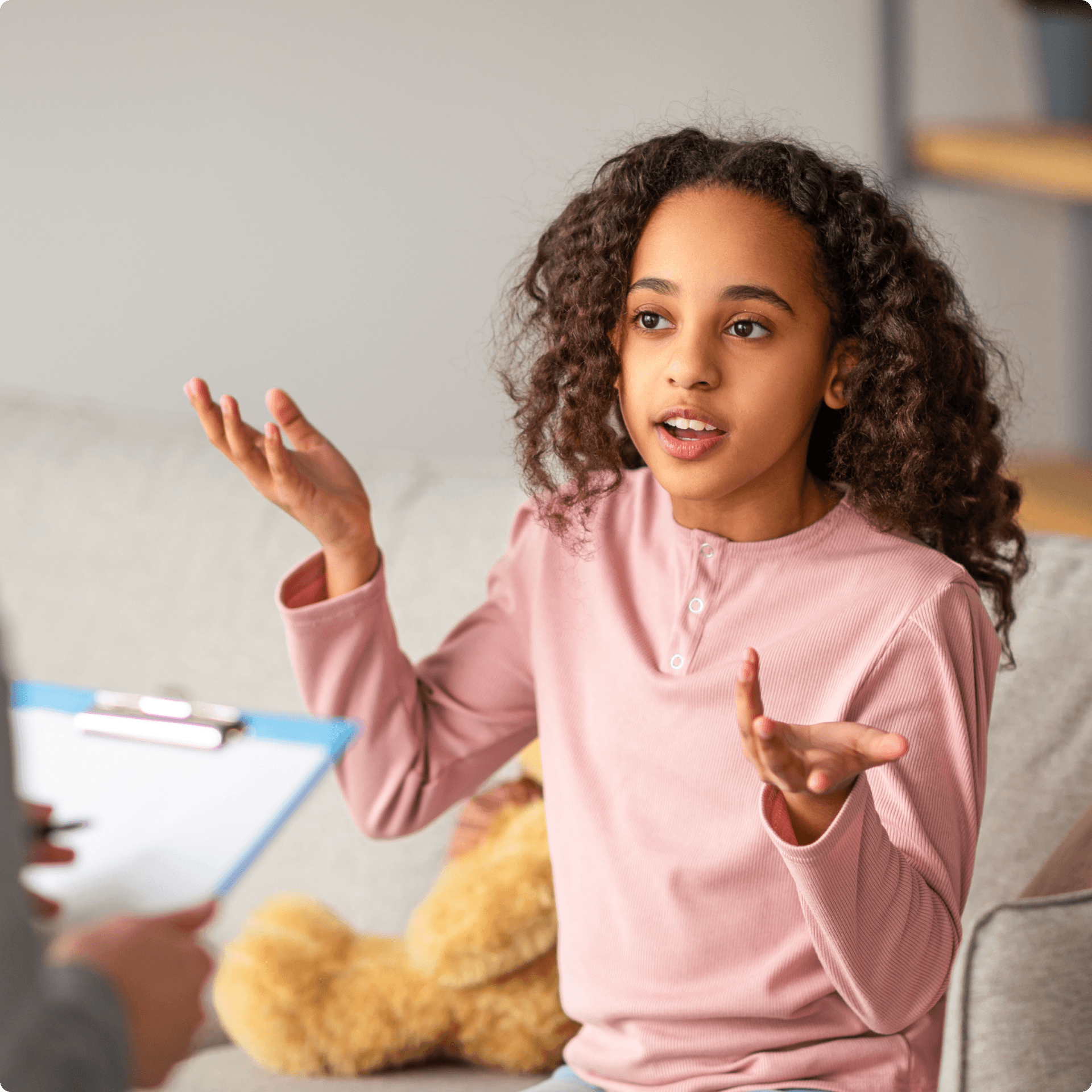Disruptive Behaviors Program
When everyday struggles turn into frequent conflicts, meltdowns, or defiance, it can feel discouraging and confusing. But experience tells us that your disruptive child isn’t a “bad kid”.
Part of our approach is to help you see the full picture of what your child is experiencing, so you can respond with confidence, not frustration. When you understand what’s driving your child’s behavior — whether it’s impulsivity, emotional regulation challenges, or difficulty handling frustration — you can move from chaos to clarity.

When is the Disruptive Behaviors Program right?
These are some of the disruptive and impulsive behaviors we see the most. If you’re seeing some of these (or others) at home, we can help you understand why and address them.

Tantrums or other behavioral upsets
Impulsive actions
Behaviors that seem to get them into trouble
Difficulty following directions
Let us guide you through care for disruptive behaviors

Care begins with a diagnostic evaluation, which at Brightline is a series of three appointments. These appointments are vital to helping us get to know you and your child. They give you clarity and build the foundation for care — we will deeply understand your concerns, explore any related needs, and create a care plan that is evidence-based, individualized, and geared towards progress.
Our goal is to schedule these sessions as close together as possible for continuity, engagement, and convenience.
The first two of the three sessions involve you and your child in largely separate conversations — one with you only, and one with a focus on your child (you’re involved as needed, depending on your child’s age, stage of development, and ability to engage).
The third session is the evaluation follow up. This is a highly interactive and collaborative opportunity to share our impressions, discuss what we know about concerns, and arrive at a research-based treatment plan.

Care begins with a diagnostic evaluation, which at Brightline is a series of three appointments. These appointments are vital to helping us get to know you and your child. They give you clarity and build the foundation for care — we will deeply understand your concerns, explore any related needs, and create a care plan that is evidence-based, individualized, and geared towards progress.
Our goal is to schedule these sessions as close together as possible for continuity, engagement, and convenience.
The first two of the three sessions involve you and your child in largely separate conversations — one with you only, and one with a focus on your child (you’re involved as needed, depending on your child’s age, stage of development, and ability to engage).
The third session is the evaluation follow up. This is a highly interactive and collaborative opportunity to share our impressions, discuss what we know about concerns, and arrive at a research-based treatment plan.
How we work with kids, teens, and families

Whether the care is centered around the parent (with parent management training, to help you understand and support your child) or is focused on the child, treatment starts with learning about disruptive behaviors and the work that will be done in treatment. Treatment goals are determined collaboratively and we work together to address anything that might get in the way of a successful treatment path.
When it comes to treatment for disruptive behaviors, the core phase focuses on learning strategies to manage symptoms and leverage your child’s strengths. Parents gain skills to help make things like homework, getting out of the house in the morning, and managing screen time easier. Teachers may learn strategies to help your child improve their attention and behavior in the classroom. And your child may learn organizational skills such as how to plan for assignments and tests, keep materials organized, and manage their time.
When the family and therapist collaboratively determine it’s time to wind care down, we enter the wrap-up phase. This is when we work together to reinforce the skills you and your child have learned, celebrate successes, and create a “what if” plan for when a return to care might be needed.
All three phases of treatment utilize progress measurements that can include practice trackers, behavioral concern trackers, positive reinforcement resources, daily report cards, daily activity planning, time management planning, and safety plans.
The length of care hinges on how care is progressing, especially if we’re addressing multiple needs. You as the parent (and our partner) will help us rank the top problems and will complete standardized questionnaires as one way of providing feedback about how you feel treatment is progressing. Progress is measured weekly and monthly.
Therapy sessions are usually 55 minutes long and psychiatry sessions are 30 minutes long.
Hear what Brightline parents have to say
“My son was very nervous about therapy, but he instantly connected with his therapist. He looked forward to chatting with her each week and telling others about his positive experience. I noticed improvements in his mood and behavior after only a few sessions. I'm very thankful for Brightline!”

Disruptive Behaviors Program FAQs
What is Brightline’s approach for supporting kids with disruptive behaviors?
One of the most effective ways to support kids with disruptive behaviors is to support parents and teachers. Having consistent, effective responses to disruptive behaviors is vital — and because these behaviors don’t only happen at home (they can also disrupt the classroom, sports practices, and other activities), it’s important that the child has consistency from the adults in their life. Depending on the child’s age, stage of development, and presentation of the concern, they may also participate in individual therapy to learn strategies that help them manage their feelings and behaviors. Much of how we treat kids with disruptive behaviors is the same as or similar to what we offer in our ADHD Program for Kids: Impulse & Attention Support.
I’m concerned about my child’s behavior. How do I know if Brightline can help?
We provide treatment for kids who are having a hard time managing behaviors including (but not limited to) tantrums, refusing to complete tasks, hitting, or using disrespectful language. If the behaviors are getting in the way at home, at school, or in the community, Brightline can help.
How do you help kids who seem angry or oppositional connect in a positive way?
We focus on understanding the feelings behind the behavior. Many kids act out because they’re overwhelmed or don’t yet have the tools to express themselves. By meeting them with patience and empathy — not punishment — we help them feel safe enough to calm down, listen, and learn new ways of expressing themselves.
What if my child behaves differently at home and school?
That’s common. In addition to the information we gather from you and your child, with your permission we’ll also get insights from other important adults in your child’s life (like teachers, counselors, and coaches). Those combine to give us a more full picture so we can uncover what triggers certain behaviors.
What if my child refuses to participate?
Parent-centered therapy is often the primary approach. We find when we work with parents, it empowers them to facilitate and reinforce healthy changes outside of the work we do in session with the child. We also use flexible, child-centered methods to engage even the most reluctant participants — through play, conversation, or creative tasks that lower defensiveness and build trust.
What if I feel like I’ve tried everything and nothing works?
You’re not alone — and you haven’t failed. That feeling is what brought you here. We know how exhausting it can feel when every day turns into a battle. Our team works alongside you to uncover what your child needs emotionally and practically, helping you rebuild connection, confidence, and hope at home.
How do you help parents who feel burned out?
We recognize every parent’s effort — and exhaustion. We offer practical tools and emotional support to help you feel confident and renewed. Your child’s progress and positive outcomes will help, too.
Will my child be labeled as “difficult”?
No. We aren’t here to label any child. We view behavior as communication, not defiance. Whatever your child is going through might be difficult, but it doesn’t reflect who they are as a person.
How can I support my child during care?
What is helpful looks different from family to family. We’ll provide specific, actionable recommendations — along with reassurance that growth is possible and help is available every step of the way.


